第三章 导语翻译
大学英语三-Unit-3-Why-I-Teach课文及翻译

大学英语三-Unit-3-Why-I-Teach课文及翻译Unit 3 Why I TeachPeter G. BeidlerEvery teacher probably asks himself time and again: What are the reasons for choosing teaching as a career? Do the rewards teaching outweigh the trying comments? Answering these questions is not a simple task. Let's see what the author says.Why do you teach? My friend asked the question when I told him that I didn't want to be considered for an administrative position. He was puzzled that I did not want what was obviously a "step up" toward what all Americans are taught to want when they grow up: money and power.Certainly I don't teach because teaching is easy for me. Teaching is the most difficult of the various ways I have attempted to earn my living: mechanic, carpenter, writer. For me, teaching is a red-eye, sweaty-palm, sinking-stomach profession. Red-eye, because I never feel ready to teach no matter how late I stay up preparing. Sweaty-palm, because I'm always nervous before I enter the classroom, sure that I will be found out for the fool that I am. Sinking-stomach, because I leave the classroom an hour later convinced that I was even more boring than usual.Nor do I teach because I think I know answers, or because I have knowledge I feel compelled to share. Sometimes I am amazed that my students actually take notes on what I say in class!Why, then, do I teach?I teach because I like the pace of the academic calendar. June, July, and August offer an opportunity for reflection, research and writing.I teach because teaching is a profession built on change. When the material is the same, I change ——and, more important, my students change.I teach because I like the freedom to make my own mistakes, to learn my own lessons, to stimulate myself and my students. As a teacher, I'm my own boss. If I want my freshmen to learn to write by creating their own textbook, who is to say I can't? Such courses may be huge failures, but we can all learn from failures.I teach because I like to ask questions that students must struggle to answer. The world is full of right answers to bad questions. While teaching, I sometimes find good questions.I teach because I enjoy finding ways of getting myself and my students out of the ivory tower and into the real world. I once taught a course called "Self-Reliance in a Technological Society." My 15 students read Emerson, Thoreau, and Huxley. They kept diaries. They wrote term papers.But we also set up a corporation, borrowed money, purchased a run-down house and practiced self-reliance by renovating it. At the end of the semester, we would the house, repaid our loan, paid or taxes, and distributed the profits among the group.So teaching gives me pace, and variety, and challenge, and the opportunity to keep on learning.I have left out, however, the most important reasons why I teach.One is Vicky. My first doctoral student, Vicky was an energetic student who labored at her dissertation on a little-known 14th century poet. She wrote articles and sent them off to learned journals. She did it all herself, with an occasional nudge from me. But I was there when she finished her dissertation,learned that her articles were accepted, got a job and won a fellowship to Harvard working on a book developing ideas she'd first had as my student.Another reason is George, who started as an engineering student, then switched to English because he decided he liked people better than things.There is Jeanne, who left college, but was brought back by her classmates because they wanted her to see the end of the self-reliance house project. I was here when she came back. I was there when she told me that she later became interested in the urban poor and went on to become a civil rights lawyer.There is Jacqui, a cleaning woman who knows more by intuition than most of us learn by analysis. Jacqui has decided to finish high school and go to college.These are the real reasons I teach, these people who grow and change in front of me. Being a teacher is being present at the creation, when the clay begins to breathe.A "promotion" out of teaching would give me money and power. But I have money. I get paid to do what I enjoy: reading, talking with people, and asking question like, "What is the point of being rich?"And I have power. I have the power to nudge, to fan sparks, to suggest books, to point out a pathway. What other power matters?But teaching offers something besides money and power: it offers love.Not only the love of learning and of books and ideas, but also the love that a teacher feels for that rare student who walks into a teacher's life and begins to breathe. Perhaps love is the wrong word: magic might be better.I teach because, being around people who are beginning to breathe, I occasionally find myself catching my breath with them.我为何教书你为什么教书呢?当我告诉我的朋友我不想做任何行政职务时,他向我提出了这个问题。
2020新上教版高中英语必修三unit3课文原文及翻译(英汉对照)
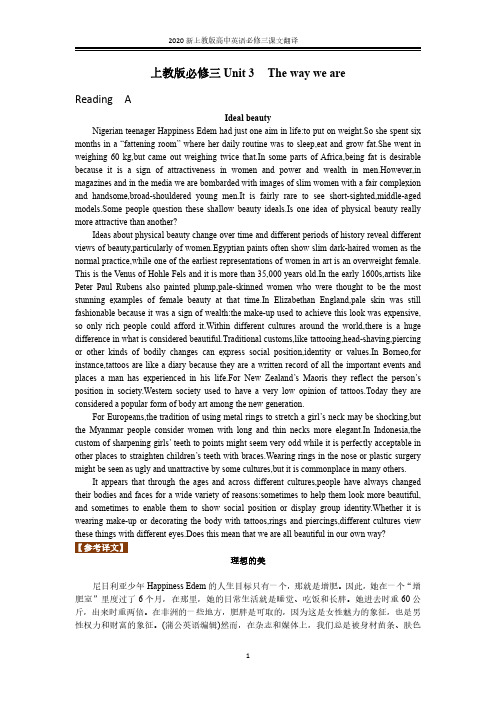
上教版必修三Unit3The way we areReading AIdeal beautyNigerian teenager Happiness Edem had just one aim in life:to put on weight.So she spent six months in a“fattening room”where her daily routine was to sleep,eat and grow fat.She went in weighing60kg,but came out weighing twice that.In some parts of Africa,being fat is desirable because it is a sign of attractiveness in women and power and wealth in men.However,in magazines and in the media we are bombarded with images of slim women with a fair complexion and handsome,broad-shouldered young men.It is fairly rare to see short-sighted,middle-aged models.Some people question these shallow beauty ideals.Is one idea of physical beauty really more attractive than another?Ideas about physical beauty change over time and different periods of history reveal different views of beauty,particularly of women.Egyptian paints often show slim dark-haired women as the normal practice,while one of the earliest representations of women in art is an overweight female. This is the Venus of Hohle Fels and it is more than35,000years old.In the early1600s,artists like Peter Paul Rubens also painted plump,pale-skinned women who were thought to be the most stunning examples of female beauty at that time.In Elizabethan England,pale skin was still fashionable because it was a sign of wealth:the make-up used to achieve this look was expensive, so only rich people could afford it.Within different cultures around the world,there is a huge difference in what is considered beautiful.Traditional customs,like tattooing,head-shaving,piercing or other kinds of bodily changes can express social position,identity or values.In Borneo,for instance,tattoos are like a diary because they are a written record of all the important events and places a man has experienced in his life.For New Zealand’s Maoris they reflect the person’s position in society.Western society used to have a very low opinion of tattoos.Today they are considered a popular form of body art among the new generation.For Europeans,the tradition of using metal rings to stretch a girl’s neck may be shocking,but the Myanmar people consider women with long and thin necks more elegant.In Indonesia,the custom of sharpening girls’teeth to points might seem very odd while it is perfectly acceptable in other places to straighten children’s teeth with braces.Wearing rings in the nose or plastic surgery might be seen as ugly and unattractive by some cultures,but it is commonplace in many others.It appears that through the ages and across different cultures,people have always changed their bodies and faces for a wide variety of reasons:sometimes to help them look more beautiful, and sometimes to enable them to show social position or display group identity.Whether it is wearing make-up or decorating the body with tattoos,rings and piercings,different cultures view these things with different eyes.Does this mean that we are all beautiful in our own way?理想的美尼日利亚少年Happiness Edem的人生目标只有一个,那就是增肥。
大学语文UNIT3翻译
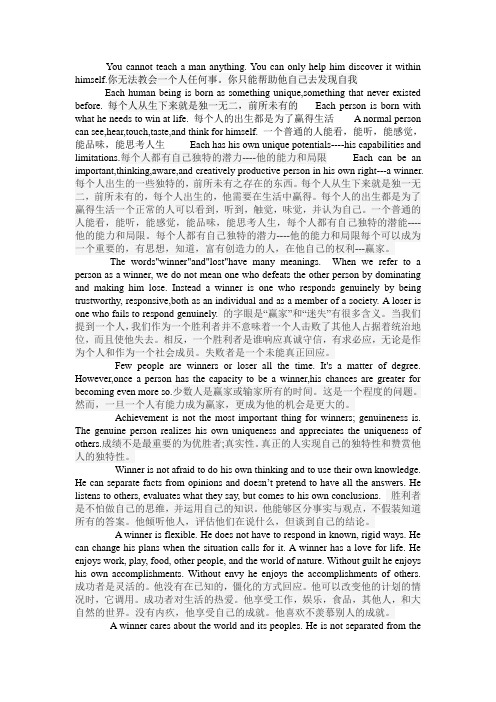
You cannot teach a man anything. You can only help him discover it within himself.你无法教会一个人任何事。
你只能帮助他自己去发现自我Each human being is born as something unique,something that never existed before. 每个人从生下来就是独一无二,前所未有的Each person is born with what he needs to win at life. 每个人的出生都是为了赢得生活 A normal person can see,hear,touch,taste,and think for himself. 一个普通的人能看,能听,能感觉,能品味,能思考人生Each has his own unique potentials----his capabilities and limitations.每个人都有自己独特的潜力----他的能力和局限Each can be an important,thinking,aware,and creatively productive person in his own right---a winner.每个人出生的一些独特的,前所未有之存在的东西。
每个人从生下来就是独一无二,前所未有的,每个人出生的,他需要在生活中赢得。
每个人的出生都是为了赢得生活一个正常的人可以看到,听到,触觉,味觉,并认为自己。
一个普通的人能看,能听,能感觉,能品味,能思考人生,每个人都有自己独特的潜能----他的能力和局限。
每个人都有自己独特的潜力----他的能力和局限每个可以成为一个重要的,有思想,知道,富有创造力的人,在他自己的权利---赢家。
The words"winner"and"lost"have many meanings. When we refer to a person as a winner, we do not mean one who defeats the other person by dominating and making him lose. Instead a winner is one who responds genuinely by being trustworthy, responsive,both as an individual and as a member of a society. A loser is one who fails to respond genuinely.的字眼是“赢家”和“迷失”有很多含义。
学术英语(社科)Unit3三单元原文及翻译
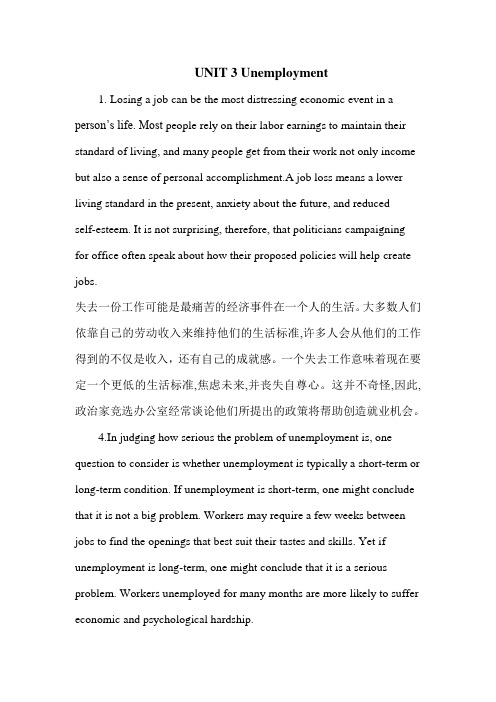
UNIT 3 Unemployment1. Losing a job can be the most distressing economic event in a person’s life. Most people rely on their labor earnings to maintain their standard of living, and many people get from their work not only income but also a sense of personal accomplishment.A job loss means a lower living standard in the present, anxiety about the future, and reducedself-esteem. It is not surprising, therefore, that politicians campaigning for office often speak about how their proposed policies will help create jobs.失去一份工作可能是最痛苦的经济事件在一个人的生活。
大多数人们依靠自己的劳动收入来维持他们的生活标准,许多人会从他们的工作得到的不仅是收入,还有自己的成就感。
一个失去工作意味着现在要定一个更低的生活标准,焦虑未来,并丧失自尊心。
这并不奇怪,因此,政治家竞选办公室经常谈论他们所提出的政策将帮助创造就业机会。
4.In judging how serious the problem of unemployment is, one question to consider is whether unemployment is typically a short-term or long-term condition. If unemployment is short-term, one might conclude that it is not a big problem. Workers may require a few weeks between jobs to find the openings that best suit their tastes and skills. Yet if unemployment is long-term, one might conclude that it is a serious problem. Workers unemployed for many months are more likely to suffer economic and psychological hardship.判断失业问题有多么严重时,其中一个问题就是要考虑是否失业通常是一个短期或长期的条件。
新编英语教程第三版4第三章翻译
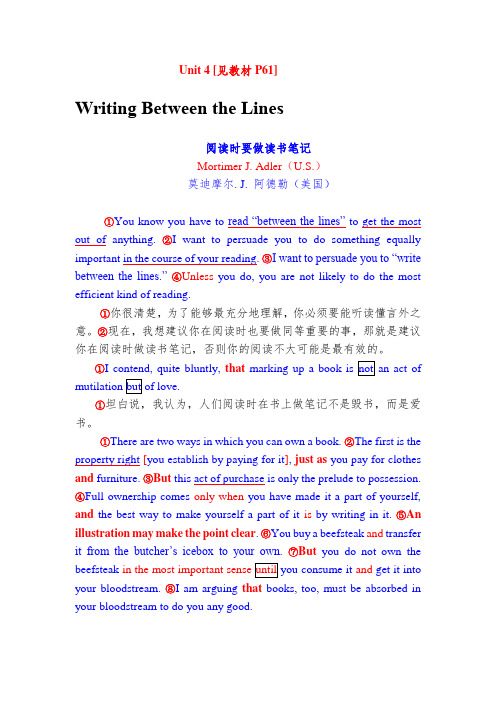
Unit4 [见教材P61]Writing Between the Lines阅读时要做读书笔记Mortimer J. Adler(U.S.)莫迪摩尔. J. 阿德勒(美国)①You know you have to read “between the lines” to get the most out of anything. ②I want to persuade you to do something equally important in the course of your reading. ③I want to persuade you to “write between the lines.” ④Unless you do, you are not likely to do the most efficient kind of reading.①你很清楚,为了能够最充分地理解,你必须要能听读懂言外之意。
②现在,我想建议你在阅读时也要做同等重要的事,那就是建议你在阅读时做读书笔记,否则你的阅读不大可能是最有效的。
①I contend, quite bluntly, that①坦白说,我认为,人们阅读时在书上做笔记不是毁书,而是爱书。
①There are two ways in which you can own a book. ②The first is the property right[you establish by paying for it], just as you pay for clothes and furniture. ③But this act of purchase is only the prelude to possession. ④Full ownership comes only when you have made it a part of yourself, and the best way to make yourself a part of it is by writing in it.⑤An illustration may make the point clear. ⑥You buy a beefsteak and transfer it from the butcher’s icebox to your own. ⑦But you do not ownthe beefsteak and get it into your bloodstream. ⑧I am arguing that books, too, must be absorbed in your bloodstream to do you any good.①人们可以通过两种方式来拥有一本书。
孙子兵法第三章英译

孙子兵法第三章英译Title: English Translation of Chapter 3 of Sun Tzu's Art of War (Expanding on the Title)Chapter 3: Planning an AttackIn the third chapter of Sun Tzu's Art of War, the focus shifts towards the strategic planning required for a successful military campaign. This chapter provides valuable insights into the importance of thorough analysis, understanding the enemy, and the significance of timing.The chapter begins by emphasizing the significance of gathering accurate intelligence before engaging in any military operation. Sun Tzu stresses the importance of knowing the enemy's strengths and weaknesses, as well as their disposition and intentions. He emphasizes that one must carefully assess their own capabilities and limitations as well. This knowledge forms the foundation for developing an effective strategy.Furthermore, Sun Tzu emphasizes the concept of deception as an essential element in warfare. He advises commanders to employ various tactics to confuse and mislead the enemy, creating an advantageous situation for their own forces. By appearing weak when strong, and strong when weak, commanderscan manipulate their opponent's perceptions and gain a strategic advantage.Timing is another critical factor highlighted in this chapter. Sun Tzu emphasizes that successful commanders understand the significance of seizing opportunities at the right moment. The ability to strike when the enemy is least prepared can lead to a swift and decisive victory. Conversely, engaging in battle prematurely or without adequate preparation can lead to defeat.To successfully carry out a military operation, Sun Tzu emphasizes the importance of proper planning and meticulous organization. He stresses that a well-structured and disciplined army is more likely to achieve victory. This involves establishing clear lines of communication, coordinating different units effectively, and maintaining a high level of morale among the troops.In this chapter, Sun Tzu also addresses the concept of victory without fighting. He argues that the ultimate goal of warfare is not necessarily to engage in direct combat, but rather to achieve one's objectives with minimal loss. By employing diplomatic strategies, negotiation, and alliances, commanders can accomplish their goals without resorting toviolence. This approach reflects Sun Tzu's belief in the importance of preserving resources and ensuring long-term stability.In conclusion, the third chapter of Sun Tzu's Art of War provides valuable insights into the planning and execution of military campaigns. It underscores the importance of gathering intelligence, understanding the enemy, employing deception, and seizing the right opportunities. By adhering to these principles, commanders can increase their chances of achieving victory while minimizing casualties and preserving resources. This chapter serves as a timeless guide for military strategists and leaders, transcending time and remaining relevant in today's complex world.。
Unit3课后翻译

Unit31.They all stretched their necks to see what was happening, as if pulledby an invisible string,2.We got out of the car to stretch a little .In front of us was a beautifulstretch of open land.3.They talked for hours at a stretch, but they still failed to settle theirdifferences.4.For all the warm weather, fresh air and delicious food, her health stilldid not recover.5.One glance at the car, and he knew that it was beyond repair. Helooked ahead and found the desert stretching as far as the eye could see without a soul in sight. He knew he was in a terrible fix.6.Wu Song swung his stick at the tiger with all his strength. But the sticksnapped and the tiger was unharmed. In his panic, he had hit the tree nearby.7.I am terribly fond of the pictures you snapped in Russia, especially theone showing the Russian coachman sitting by the Black Sea with his supper in a cloth on his knees.8.“You can’t just let it go at that,” I tried to plead with him.“It is none of your business,” he snapped.9.He snapped his briefcase to, stood up, and said “Then it’s all settled.”10.H e was standing in front of his house on a hill, only about a hundredmeters apart/away from the wharf when the tsunami came.。
大学英语教材第3单元课文翻译
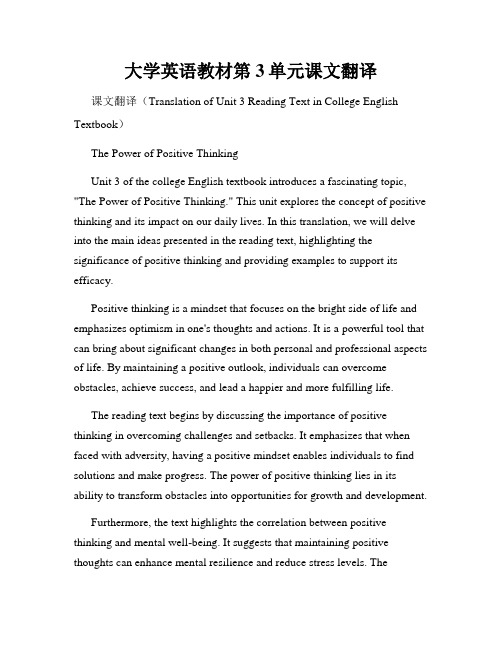
大学英语教材第3单元课文翻译课文翻译(Translation of Unit 3 Reading Text in College English Textbook)The Power of Positive ThinkingUnit 3 of the college English textbook introduces a fascinating topic, "The Power of Positive Thinking." This unit explores the concept of positive thinking and its impact on our daily lives. In this translation, we will delve into the main ideas presented in the reading text, highlighting the significance of positive thinking and providing examples to support its efficacy.Positive thinking is a mindset that focuses on the bright side of life and emphasizes optimism in one's thoughts and actions. It is a powerful tool that can bring about significant changes in both personal and professional aspects of life. By maintaining a positive outlook, individuals can overcome obstacles, achieve success, and lead a happier and more fulfilling life.The reading text begins by discussing the importance of positive thinking in overcoming challenges and setbacks. It emphasizes that when faced with adversity, having a positive mindset enables individuals to find solutions and make progress. The power of positive thinking lies in its ability to transform obstacles into opportunities for growth and development.Furthermore, the text highlights the correlation between positive thinking and mental well-being. It suggests that maintaining positive thoughts can enhance mental resilience and reduce stress levels. Theoptimism cultivated through positive thinking promotes better emotional health and offers a sense of control over one's life.The reading text also emphasizes the impact of positive thinking on success. It argues that by embracing a positive attitude, individuals can enhance their performance and increase their chances of achieving their goals. Positive thinking enhances motivation and perseverance, allowing individuals to overcome obstacles and reach their desired outcomes.Real-life examples support the claims made in the reading text. The story of Thomas Edison serves as an illustration of the power of positive thinking. Despite facing numerous failures in his quest to invent the electric light bulb, Edison maintained his optimism and believed in his abilities. His unwavering positive mindset eventually led to his success, demonstrating the transformative power of positive thinking.In conclusion, the reading text in the third unit of the college English textbook emphasizes the significance of positive thinking in our lives. It suggests that by cultivating a positive mindset, individuals can overcome challenges, enhance their mental well-being, and increase their chances of success. The power of positive thinking lies in its ability to shape our thoughts and actions, enabling us to lead more fulfilling lives. Let us embrace the power of positive thinking and make a difference in our own lives and the lives of those around us.(Note: The above translation is an example and may not be an actual translation of the Unit 3 reading text in a college English textbook. The provided content is solely for illustrative purposes.)。
- 1、下载文档前请自行甄别文档内容的完整性,平台不提供额外的编辑、内容补充、找答案等附加服务。
- 2、"仅部分预览"的文档,不可在线预览部分如存在完整性等问题,可反馈申请退款(可完整预览的文档不适用该条件!)。
- 3、如文档侵犯您的权益,请联系客服反馈,我们会尽快为您处理(人工客服工作时间:9:00-18:30)。
用"-ing form"表示结果 Beverly Hills, Calif. (Reuters) —— "Titanic", Hollywood's most expensive movie ever, won the Golden Globe award for the year's best dramatic film Sunday, making it the early front-runner in March's Academy Awards. 译文:路透社加州贝弗利山庄讯——迄今耗资最高 的好莱坞影片《泰坦尼克号》星期日获"金球奖" 年度最佳剧情片奖,为该片在三月份竞争奥斯卡金 像奖创造先声夺人的气势。
返回章重点 退出
单项新闻事实导语的翻译
[5] Airlines across Asia are reminding passengers of strict limits on hand baggage in the run-up to Lunar New Year。 译文:目前亚洲各航空公司都在提醒乘客,春节将近, 登机随身行李会有严格规定。 [6] Heilongjiang Governor Song Fatang met this morning with an exchange delegation from Ishikawa University in Japan. 译文:今天(21日)上午,黑龙江省省长宋法棠亲切会 见了日本石川县大学交流代表团。 [7] Five car manufacturers have gone into battle in an effort to win contracts to supply new taxis for the streets of Shanghai. 译文:全国五大汽车厂家在上海出租汽车市场上竞 比高低。
例2 :Biblioteka 标题副标题 江主席与普京总统通电话 (导语) 就世界和平与安全、联合国的作用和上海合作组织 圣彼得堡峰会等共同关心的重要问题交换看法
新华社北京4月17日电 正在突尼斯进行国事访 问的中国国家主席江泽民17日应约与俄罗斯总统普 京通了电话。双方就世界和平与安全、联合国的作 用和上海合作组织圣彼得堡峰会等共同关心的重要 问题交换了看法。
返回章重点 退出
Syntactic Structure of English News Leads
[1] Eleven people were killed and four missing yesterday after Typhoon Chanchu pummeled Guangdong and Fujian Provinces. ① WHO —— eleven people …and four … ② WHY —— Typhoon Chanchu ③ WHEN —— yesterday ④ WHERE —— Guangdong and Fujian Provinces ⑤ WHAT —— eleven people were killed and four missing
Chapter Three
New Lead Translation
Teaching contents
1. Concept of English News Leads 2. Features of English News Leads 3. Syntactic Structure of English News Leads 4. Semantic Structure of English News Leads 5. Types of English News Leads and the Translation
返回章重点 退出
[3] A bomb explosion caused the crash of an Air India jumbo jet off Ireland last year in which all 329 people aboard were killed, investigation for the Boeing Company and the Indian government have testified. 这条导语包含四个方面的消息: A)炸弹爆炸引起飞机坠毁; B)印航大型机去年在爱尔兰离岸坠毁; C)机上329人遇难; D)波音公司和印度政府的调查人员证实(上述原因)。
返回章重点 退出
Semantic Structure of English News Leads
[2] An Iranian journalist, Simon Farzami, has been executed in Tehran for spying for the U.S. Embassy and working for the late Shah's police, friends said Friday.
返回章重点 退出
因果型导语的翻译
先因后果型导语的翻译
用"with"表示结果 Widespread violence marred the first phase of voting in the general election yesterday, with at least 22 people killed and dozens injured in clashes around the country. 译文:由于到处发生暴力冲突事件,昨天大选 第一阶段投票工作受阻,全国的冲突至少造 成22人丧生,数10人死亡.
返回章重点 退出
多项新闻事实导语的翻译
The Sixth United Nations Conference on trade and development ended Sunday with developing nations dismayed that the high level meeting yielded virtually no new commitments for increased economic aid from industrial nations. 这条导语为读者提供了三条新闻事实: ① The Sixth United Nations Conference on trade and development ended Sunday. ② Developing nations dismayed. ③ The high level meeting yielded virtually no new commitments for increased economic aid from industrial nations.
返回章重点 退出
4] BRUSSELS —— A strike started on Monday by Brussels policemen spread on Tuesday to the whole country. 这条导语提供的新闻事实: ① A strike started on Monday by Brussels policemen. ② The strike spread on Tuesday to the whole country.
级市第二位。
在首批公布的 145个行业标志性品 牌中,本市共有来自 5家企业的7个品牌上 榜,其中海尔集团共 获得电冰箱、洗衣机 (选自青岛《半岛都市报》2006-8-24) 和电热水器三个行业 的标志性品牌,是全 国行业标志性品牌最 多的企业;其他4个 标志性品牌分别是青 岛啤酒、
返回章重点 退出
新闻(news): An Iranian journalist, Simon Farzami, has been executed in Tehran. 背景(background): He was spying for the U.S. Embassy and working for the late Shah's police.
选自《人民日报》(2002年4月18日第一版)
正文
返回章重点 退出
【汉译英】 Chinese, Russian Leaders Talk Over Phone
Thur Apr 18 Beijing Time People's Daily
Beijing, April 17 (Xinhua)——Chinese President Jiang Zemin had a phone conversation with Russian President Vladimir Putin at the latter's request on Wednesday, according to China's Foreign Ministry. Jiang, who is paying a state visit to Tunisia, discussed with Putin key issues of common concern, including world peace and security, the role of the United Nations, and a summit meeting of the Shanghai Cooperation Organization which will be held in St. Petersburg, Russia. ( )
返回章重点 退出
译例: 译文1:布鲁塞尔警察星期一举行的罢工,到 星期二已蔓延到全国。 译文2:布鲁塞尔警察星期一举行罢工;星期 二罢工已蔓延到全国。
返回章重点 退出
Types of English News Leads and the Translation
